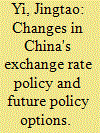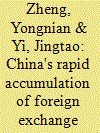| Srl | Item |
| 1 |
ID:
074902


|
|
|
|
|
| Publication |
2006.
|
| Summary/Abstract |
In responding to US pressure for changes in China's exchange rate regime, Chinese Premier Wen Jiabao has repeatedly said that the reform of the RMB exchange rate was a matter of China's sovereignty and that any external pressure or politicisation of an economic matter would not be conducive to a solution of the issue.
|
|
|
|
|
|
|
|
|
|
|
|
|
|
|
|
| 2 |
ID:
090936


|
|
|
|
|
| Publication |
2009.
|
| Summary/Abstract |
Since China introduced a new managed floating exchange rate regime in 2005, the persistent appreciation of the renminbi against the US dollar has led Chinese firms to reassess their choice of invoice currency among the dollar and other international alternatives to price their exports. The present paper performs a systematic invoice currency analysis by surveying the published literature, summarizing criteria for decision-making, and evaluating the choices available to Chinese exporters implementing currency invoicing strategies to maximize expected profits. This study finds that the euro could play an increasing role as the invoice currency of Chinese firms, although the US dollar will still play a dominant role. Chinese exporters might shift gradually from the dollar to the euro in the face of the falling dollar, balancing between the two by necessity.
|
|
|
|
|
|
|
|
|
|
|
|
|
|
|
|
| 3 |
ID:
076891


|
|
|
|
|
| Publication |
2007.
|
| Summary/Abstract |
In late February 2006, China surpassed Japan to become the world's largest holder of foreign exchange reserves. Beijing is now faced with the growing challenge of how to handle these vast reserves effectively. Although China's soaring foreign exchange reserves indicate that its overall strength has grown, they have created internal and external pressures on the balance of the economy, and introduced risks to the financial system. It is estimated in the present study that foreign exchange reserves of approximately US$ 400bn in 2005 would have been appropriate under circumstances of a managed floating exchange rate regime and capital control. China's actual reserves have far exceeded its normal demand. The objective of China is to maintain an optimal level that maximizes net benefits as a whole. Four main policy options are available for China to achieve its target: spending and investing foreign exchange reserves, gradual liberalization of the capital account, diversification of foreign exchange reserves and a switch in holders of foreign exchange reserves. Spending and investing in foreign exchange reserves can be undertaken in combination with liberalization in the capital account, given careful consideration of the risks involved. Liberalization should be extensive but gradual so that companies and individuals can adjust to changes in financial markets and manage portfolios while avoiding unnecessary risks.
|
|
|
|
|
|
|
|
|
|
|
|
|
|
|
|
| 4 |
ID:
083372


|
|
|